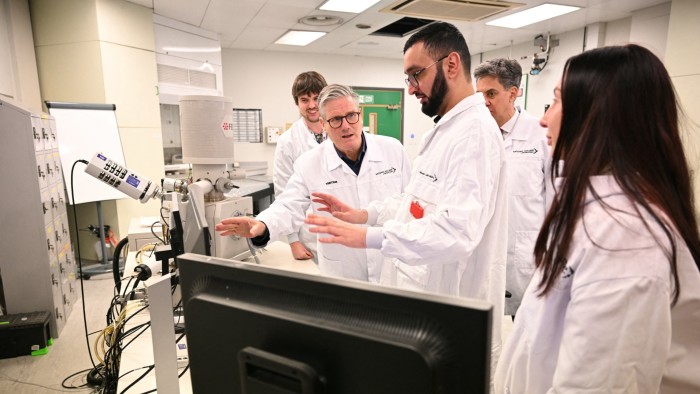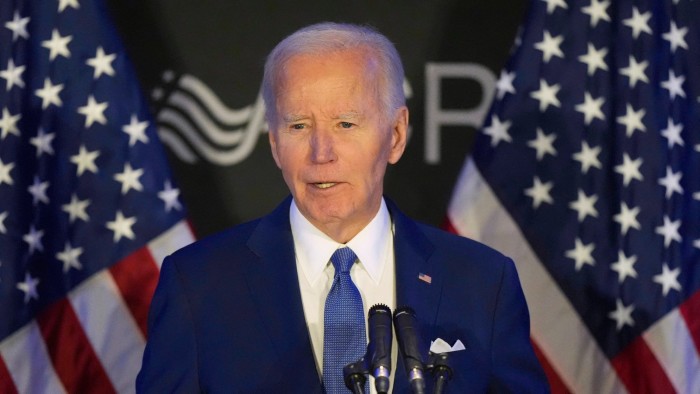UK steps up efforts to woo scientists fleeing the US

Unlock the Editor’s Digest for free
Roula Khalaf, Editor of the FT, selects her favourite stories in this weekly newsletter.
The UK’s scientific institutions are stepping up investment plans in the face of attacks on research by Donald Trump’s administration, unveiling 10-year official funding guarantees and fellowships open to experts fleeing the US.
The initiatives to be unveiled by the UK government, the Royal Society and the Royal Academy of Engineering within days will bolster efforts to woo international talent and give extra financial stability to long-term projects in fast-advancing fields such as quantum computing and bacterial resistance.
The measures amount to an effort to Trump-proof British science against the kind of sudden funding cuts and ideological suppression of research seen in the US.
“International science is in a state of flux, with some of the certainties of the postwar era now under question,” said Sir Adrian Smith, president of the Royal Society, the UK’s national science academy. “With funding streams and academic freedom coming under threat, the best scientific talent will be looking for stability. The UK can be at the front of the queue in attracting that talent.”
The Royal Society will announce a new Faraday Fellowship for international researchers, backed by up to £30mn. The money will be used to award up to £4mn, or more in exceptional circumstances, to individual scientists or teams for work lasting between five and 10 years.
Two-thirds of the £30mn will come from an existing government-funded scheme run by the society aimed at attracting mid-career researchers interested in relocating to the UK. The remainder will be new money from the society itself and will be focused on scientists at other career stages.
Simultaneously, the Royal Academy of Engineering will launch an accelerated route to make it easier for “exceptional international researchers and inventors to come and work in the UK”.
It will give successful applicants up to £3mn over 10 years to develop and scale up breakthrough climate solutions, as part of the academy’s existing £150mn Green Future Fellowship programme.
The initiatives add to a similar £54mn programme announced by the Department for Science, Innovation and Technology this month. The money will pay relocation costs and project funding for about 10 teams of researchers in government priority areas such as life sciences, artificial intelligence and green energy.
The initiative has been welcomed by scientific institutions, although many have also raised concerns about the potential deterrent effect of high visa costs on broader efforts to recruit internationally.
The department will separately unveil a plan to provide a decade-long funding guarantee for researchers in frontier fields.
The extended financing aims to give institutions extra certainty to recruit and collaborate internationally, build needed infrastructure and forge partnerships with the private sector.
The 10-year grants could account for about £2bn of the £20.4bn in annual research and development (R&D) spending across government, said Lord Patrick Vallance, science minister and a former government chief scientific adviser.
Vallance said he believed “very strongly” that investment in science and technology was a “national endeavour, not a party political endeavour” — even though he conceded any future administration could theoretically reverse the funding changes.
Since the Trump administration took office in January, it has sought to impose big cuts on science funding. It has also ordered the scrapping of research work in areas including diversity, vaccines and climate change.
In Britain, Nigel Farage’s Reform UK party, which is ahead of Labour in the polls and won hundreds of seats in this month’s local elections, has attacked official policies on net zero carbon emissions and diversity, equity and inclusion. It has also promised to “slash government waste”.
Vallance acknowledged there was “always a risk” that established long-term research funding streams could be cancelled by a future government with a radical approach to science policy. The minister, who used to be president of R&D at pharmaceuticals company GSK, said he would “continue to push” for the long view on investment.
“Chopping and changing in R&D is a very bad way to get progress,” he said. “You damage things”.








